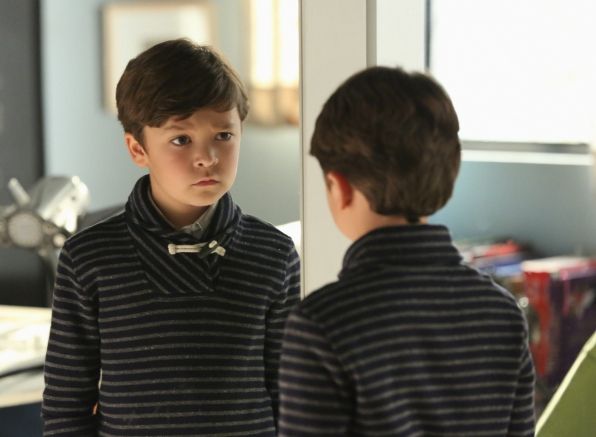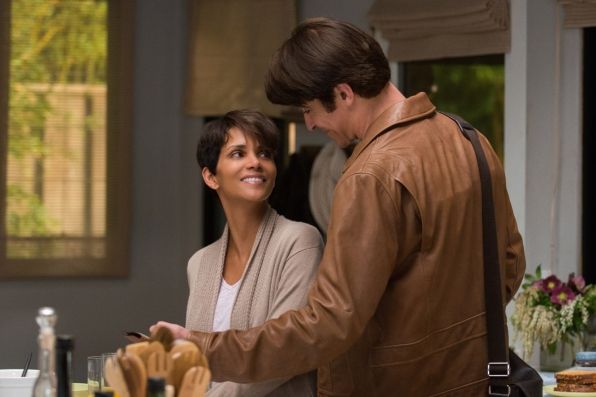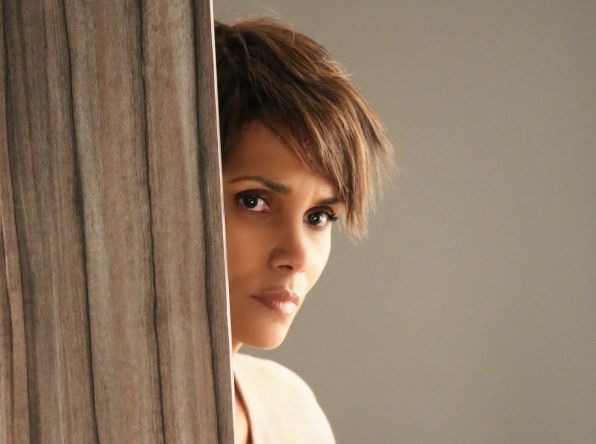Think of Extant as a sci-fi spin on Rosemary’s Baby, with a dash of Pinocchio and a sprinkle of Blade Runner.
Tonight CBS premieres its ambitious new summer “event” series (akin to last year’s launch of Under the Dome), which would be notable enough for luring Oscar winner Halle Berry for her television debut. But Extant also brings a heady blend of straight science fiction, atmospheric horror and heady philosophical underpinnings that’s become increasingly rare on the broadcast networks.
Executive producer and showrunner Greg Walker met with the press earlier this summer to provide a peek into the Amblin Entertainment series, which pushes the notion of species extinction into intensely intimate territories.
On the basic setup of the 13-episode season:
Greg Walker: Extant centers on the story of Molly Woods [played by Berry], who is an astronaut-scientist who just returned from a 13-month solo mission in space – it's set in the not-so-distant future. She returns with startling news and has to react to this extraordinary circumstance of having brought back some unexpected visitor. And she also has a family at home: a husband, John [Goran Visnjic], who is a Humanic designer. Humanic is a kind of android of the future, the first robot child who will be integrated and mainstreamed into the world using the philosophy that what will make machines and robots more human ultimately is to give them a human experience. So we have a woman returning to her family faced with this extraordinary circumstance of bringing back an unintended visitor and having basically two children to deal with: the one inside her and the one that she's been raising, who is this Humanic. And the story is set against a backdrop of international paranoia and conspiracy and ultimately tells the story about how Molly Woods struggles to keep this family extant, meaning “not extinct.”
Halle Berry Reveals What Drew Her to Television For "Extant"
On the disquieting theme of potential extinction that permeates Extant:
What's definitely in the water is this idea of A.I. [artificial intelligence] kind of taking over us and then ultimately technology will pull us apart and distract us. The great fear that when a certain supremacy is hit in the actual A.I., that we will no longer matter. So extinction plays on a couple of different levels in the show, the alien element as well, but certainly on the idea of what Ethan represents for the future and represents to his own family and how he could be integrated in the world in a way that doesn't bode for our destruction.
On the philosophical approach to the artificial intelligence storyline:
John’s an exceptionally gifted A.I. engineer who's worked in A.I. for a while, so he's worked in other applications of A.I., and I think the central thesis he has is that technology, to its own end – and we're talking about where we're all going in the future with robotics and A.I.-driven robotics – could divide us as people, essentially because they can't replicate the human experience. We are connecting with your iPhone right now or with your iPad – something that doesn't give back, and ultimately the more that we walk down the street now and we see all these people kind of individually connected to their devices, the more we see that we're not connecting to each other. And that is a concern to John, so John wants to create a Humanic – that's what he calls his Android son – that could connect back, that could actually give back. And given that we're not going to get away from technology – it's not going to go away from our lives tomorrow; we're not going to become this kind of Luddite clan where we're roasting pigs over open flame now. We're going to still have technology in our lives. That's inevitable. How do we imbue that technology with the best of us and what's human?
On the intriguing possibilities within Extant’s A.I.-as-offspring theme:
There's a certain kind of blindness an inventor has about his own creation and where his personal needs are being met and not being met by that creation. So a lot of the story right now is, there's a hubris in an inventor, an inventor who creates something in his own likeness. And that God-like story plays out for John in many different ways – mostly in that with an A.I., the progress is unpredictable. Even though John wants to limit the A.I.'s input as human-only input – meaning he's not patched with certain kinds of accelerated languages, or he's not able to learn a Tchaikovsky concerto on violin in one second. You can teach the computer that. He didn't want Ethan to learn that way. He wanted Ethan to learn through the human experience with the idea that ultimately, if we want robots and technology to exist in our world without squashing us or tearing us apart, they need to function the way that we do. So it's this idea of maybe, potentially, creating a soul for a robot and a soul through technology.
On bringing Halle Berry to television:
I have to credit Halle Berry's representatives, because they came after us very quickly when the script was just out in the ether, when it was kind of passed around and Mickey’s [Fisher] script got such buzz. Mickey's script was his first project: guy nobody had ever heard of, he wrote this script that everybody read, including myself, and got super-excited about, and when we did, Halle's people started calling us immediately. As soon as I got attached, I was coaching a baseball game, a Little League game, and my phone rang. I was coaching first base, and her agent was saying, “We want Halle in this.” We luckily got the person who we wanted most, who wanted it as well.
On executive producer Steven Spielberg’s inimitable touch:
Certainly the sense of awe and wonderment in the storytelling, where his expertise in crafting very relatable, human and emotional stories that have kind of extraordinary sensational elements to them. So with science fiction, yes, he is the guy that when you're sitting across the other side of the table, you realize that he's the most successful writer, really – because he wrote a lot of those – in the history of the business for telling these types of stories, if not any kind of story. So it's like playing tennis with the very best tennis player in the world.
On bringing feature film-level effects to the small screen:
Originally in Mickey's script there was no zero-g. And Steven Spielberg read it and said, “We're doing it!” I remember we hadn't yet gone out wide with the script and I saw Gravity and went “Oh, no – now the bar is going to be set for zero-g!” But Steven wasn't afraid of that at all and really pushed us to put zero-g in a big way. And as you can see, the effects work was extraordinary. Halle is a natural. We shot that over three days, the zero-g stuff, in a way that was beautiful to watch. It's like watching ballet, the way that they work with the wires and the way that they flew Halle through space. She did it effortlessly.
On maintaining the show’s mystery and intrigue from week to week:
I learned working on The X-Files. They were masters – Chris [Carter] and Frank [Spotnitz] and John [Shiban] and Vince [Gilligan] – of mythology storytelling, always leaving the viewer wanting more. But still, we have a mandate that each episode: You have to learn something new about a character or about the story that you didn't know before. So yeah, we have a really interesting, multi-layered mystery, I hope! I hope people are intrigued by it, that it is developed over the course of time, so that we can give little pieces of our characters or larger pieces about the plot, and not feel like we've exhausted it all.
On the future beyond Extant’s summer run:
We're already looking into Season 2 and some bigger ideas, but that's a long way from reality. We've got to make Season 1 work. … We never [had a five-year plan]. Mickey wrote a pilot script, then we started hanging out in coffee shops and talking about what we could do with the story and where it could go. There's some colliding trains that he's built into his storytelling naturally. There's the alien baby, and there's the Humanic child. Those feel like, from a storytelling perspective, trains that need to collide some place sometime soon.
On Berry’s involvement as the star of Extant, should the series continue beyond the first season:
Heck, yeah! For sure, yes. She's phenomenal. She's embodied this role immediately with ease, with a lot of intelligence and warmth. And yeah, she would be the center of the series, and she'd continue to be the center of the series as we went on.
On the influences behind Extant:
There are a ton! On the headier side, the [Andrei] Tarkovsky movies. We love Close Encounters as a movie: When we went and pitched the story, we centered this on Close Encounters because, in a similar way, Richard Dreyfuss plays an ordinary man who sees something extraordinary. How does he react to that? And a full chapter of our three chapters of our storytelling is basically what we call “the Close Encounters chapter,” and that's the kind of ending of our three chapters for the season. It's a movie that connects to me emotionally, a family story about a man trying to preserve his family but still driven to try to see what's out there. And a story about what's out there, and what does it mean? And is it benevolent? What does it want from us? So we use that, certainly. And X-Files just in terms of there's a scary element to our show. And so how it's filmed and how the stories are told, and how you mete out that information in doses, those are all huge influences. Everybody in the writer's room comes out with something different.
Extant premieres tonight at 9 ET/PT on CBS.




